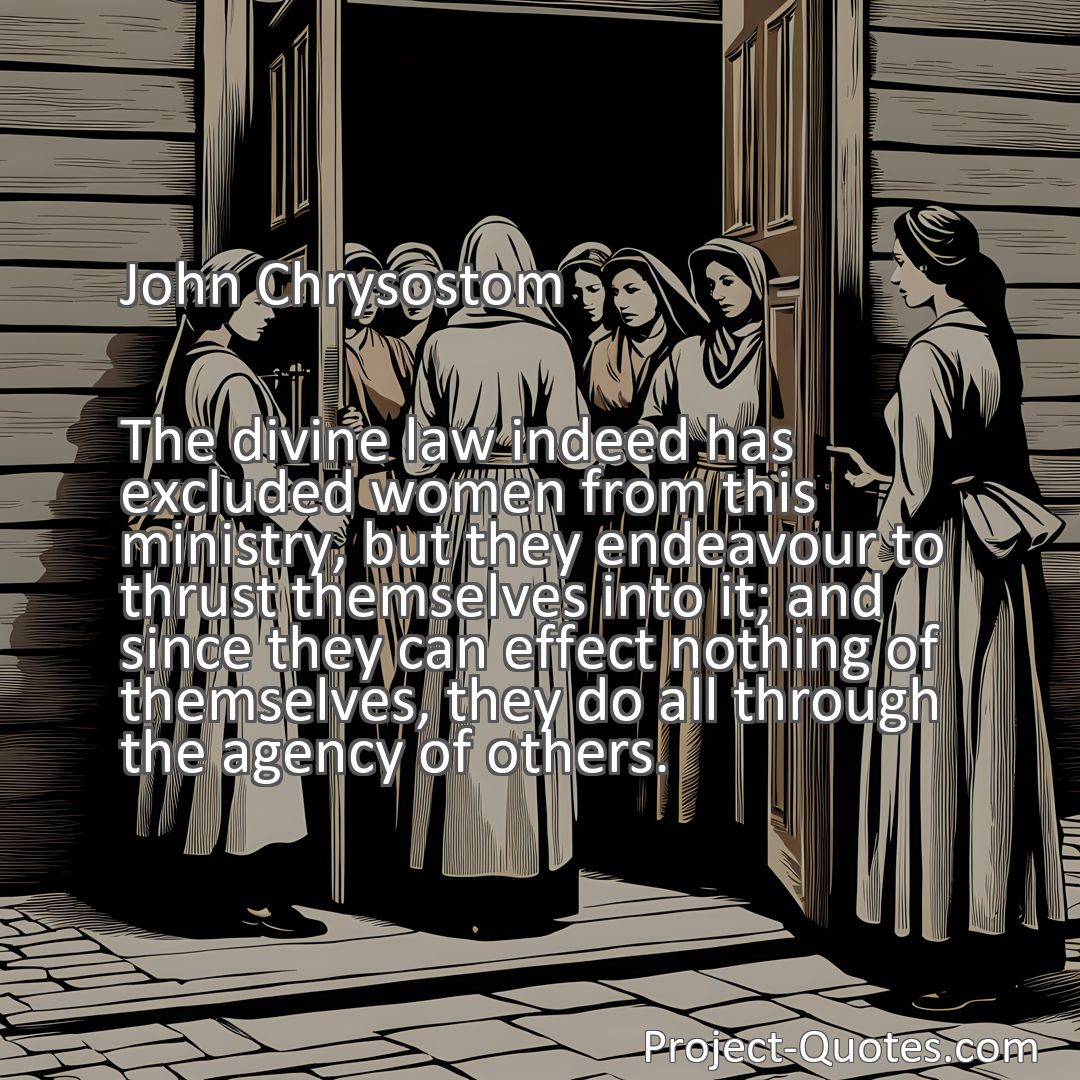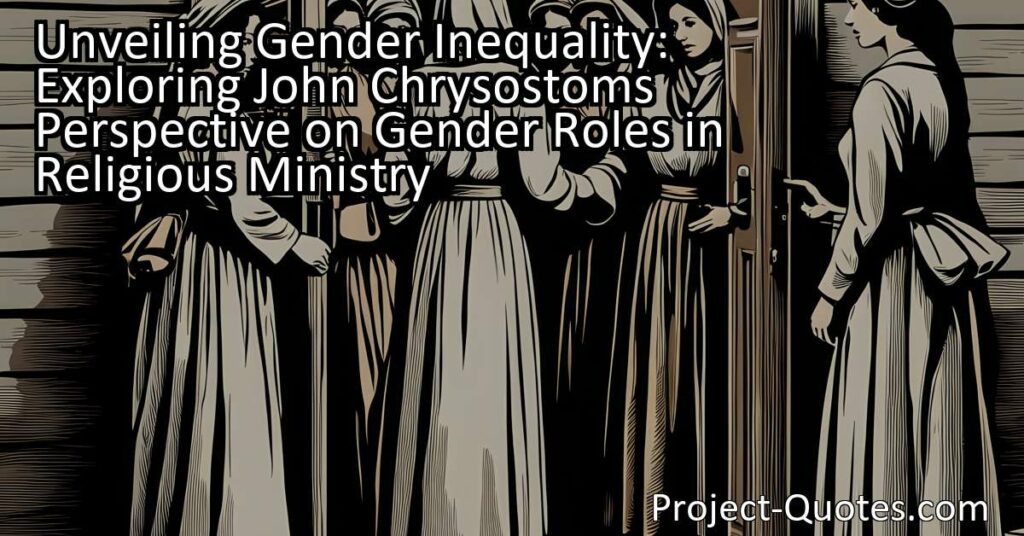The divine law indeed has excluded women from this ministry, but they endeavour to thrust themselves into it; and since they can effect nothing of themselves, they do all through the agency of others.
John Chrysostom
Gender inequality within religious contexts perpetuates societal norms and limits women’s potential. By relegating women to subordinate roles, religious institutions contribute to social, economic, and political gender disparities. It is crucial to critically analyze and question the implications of this inequality in order to promote inclusive practices and foster equal opportunities for all individuals interested in pursuing religious ministry.
Table of Contents
- 1 The divine law indeed has excluded women from this ministry, but they endeavour to thrust themselves into it; and since they can effect nothing of themselves, they do all through the agency of others.
- 2 John Chrysostom
- 3 Meaning of Quote – The divine law indeed has excluded women from this ministry, but they endeavour to thrust themselves into it; and since they can effect nothing of themselves, they do all through the agency of others.
- 4 Freely Shareable Quote Image
- 5 Related
Meaning of Quote – The divine law indeed has excluded women from this ministry, but they endeavour to thrust themselves into it; and since they can effect nothing of themselves, they do all through the agency of others.
Gender Roles in Religious Ministry: An Exploration of John Chrysostom’s Perspective
Introduction :
John Chrysostom, an early Church Father, once claimed, “The divine law indeed has excluded women from this ministry, but they endeavour to thrust themselves into it; and since they can effect nothing of themselves, they do all through the agency of others.” In this quote, Chrysostom shares his opinion on the role of women in religious ministry, emphasizing the prevailing exclusion of women at that time. Throughout history, gender roles within religious contexts have been a subject of discussion and debate. This article aims to delve deeper into Chrysostom’s perspective, understanding the historical context, and exploring the implications of gender inequality in religious leadership.
Historical Context of Gender Roles in Religious Ministry :
To fully understand John Chrysostom’s perspective, it is crucial to consider the historical context in which he lived and preached. Chrysostom was an archbishop of Constantinople in the 4th century, and his views were shaped by the social norms and cultural expectations of his time. During this period, the role of women in society was generally restricted, and religious institutions were no exception.
In Chrysostom’s era, women faced various limitations and were often excluded from positions of religious authority. The societal norm dictated that women’s primary role was within the domestic sphere, while men were assigned leadership roles in religious communities. Consequently, gender inequality in religious ministry was widely accepted.
Exegesis of John Chrysostom’s Quote :
When Chrysostom states, “The divine law indeed has excluded women from this ministry,” he is likely referring to biblical passages that have been interpreted to restrict women’s involvement in religious leadership. Within the Christian tradition, certain verses, such as 1 Timothy 2:12 , have been used to argue against the ordination of women.
Furthermore, Chrysostom suggests that women “endeavour to thrust themselves into” ministry, implying that they are attempting to enter this domain despite the limitations imposed upon them. He asserts that women are reliant on others to achieve any impact they desire in spiritual matters. This view reflects prevailing gender roles in which women were often seen as dependent on male figures for influence and agency.
It is important to note that John Chrysostom’s perspective on women in ministry remains controversial and has been criticized for perpetuating gender inequality. However, it is imperative to consider the historical context in which he lived and the limited opportunities women had in pursuing religious leadership roles during that time.
Implications and Challenges of Gender Inequality :
Chrysostom’s view reflects the patriarchal nature of early Christianity, which subsequently shaped and influenced the development of religious institutions for centuries. The exclusion of women from ministry positions has far-reaching implications on gender equality, individuals’ spiritual development, and the overall perspective on women’s capabilities.
Gender inequality within religious contexts perpetuates societal norms that limit women’s potential and reinforce outdated stereotypes. By relegating women to subordinate roles, religious institutions inadvertently contribute to social, economic, and political gender disparities. This exclusion deprives communities of diverse perspectives, talents, and spiritual leadership.
Furthermore, gender inequality can result in the stifling of women’s spiritual growth and potential. When women are barred from holding leadership positions, they are denied the opportunity to exercise their spiritual callings fully. This limitation robs them of the chance to contribute to the theological discourse, develop their spiritual gifts, and play an active role in the spiritual guidance of their communities.
Conclusion :
John Chrysostom’s quote sheds light on the historical barriers and challenges that women have faced in religious ministry. While his perspective reflects the societal norms of his time, it is crucial to critically analyze and question the implications of gender inequality within religious contexts. By exploring historical perspectives, understanding contemporary challenges, and promoting inclusive practices, societies can work towards overcoming gender disparities, celebrating diversity, and fostering equal opportunities for all individuals interested in pursuing religious ministry.
I hope this quote inspired image brings you hope and peace. Share it with someone who needs it today!


